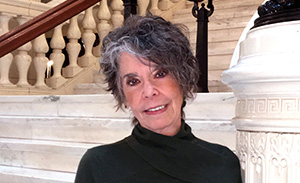Hello everyone.
 While we patiently wait for a thaw and the switch to our spring tour schedule, I thought I would take some time to let you know what has been going on with docent governance, members of which have had a busy winter.
While we patiently wait for a thaw and the switch to our spring tour schedule, I thought I would take some time to let you know what has been going on with docent governance, members of which have had a busy winter.
The “apex” of our governance structure is the Docent Council that represents and articulates docent interests and concerns to the rest of the CAC – staff, other volunteers, Board of Trustees – and provides governance to the docent body. There are 12 elected members who deliberate and vote, plus a 13th member, the Docent-at-Large. Officers are elected from the twelve: I am in my third and final year as President, serving with Kent Foutty, Vice-President/Treasurer, and Judith Kaufman, Secretary. Docents are represented on Board of Trustees’ committees, and the President and Docent-at-Large (Bill Lipsman) also attend BOT meetings.
Docent Council is heavily advisory, but unlike the US or British cabinet, DC members are not specialized in knowledge, representative of a particular point of view, or in charge of specific projects. The work of actually running the docent show and getting things done resides in DC’s committees. The Education and Tour committees are large and complex bodies whose work is obvious from their titles; they touch every docent’s experience. Marketing, Communications, Enrichment, and Library keep us informed and knowledgeable. DC committees are analogous to congressional committees in that they are where policies are crafted and actual work is done.
So what is Docent Council doing when it meets every month? Our February agenda is representative of the work we do. DC receives monthly updates from Lynn Osmond and Michael Malak, so that all members are well-informed as to the workings of the Center – programs, honors, new initiatives, operations, revenue. DC ratifies all tour director appointments suggested by the tour committee; we approved three new TDs last month. The Education Committee reported on applications for the Class of 2019 and reinforced the call for sponsors, readers, and certifiers. DC members who had not already volunteered to help on this front did so, as well as resolving to spread the word and recruit others. We also discussed the need for a clear enunciation of the policy requiring GTS use and re-visited the efficacy of the cold weather policy, which was put to the test this winter after many years of non-use. Docent Council also developed, discussed, and approved a set of guidelines for retiring docents who wish to be considered for the honorific Emeritus status. Previously, this was a very qualitative process applied with the best of intentions but sometimes unevenly. Now there are very clear guidelines.
Finally, we were updated on the continuing effort to streamline and rationalize the Docent Handbook. Information and policies should be as easy to find as possible.
Governance should reward service and experience, while encouraging new participants and viewpoints. The Docent Council was established as part of the bylaws that created the original Chicago Architecture Foundation over fifty years ago. Its vibrancy and relevance are predicated not just on the dedication of the people elected to it, but more so by the people who did the electing. I would like to encourage everyone to not just know who the members of Docent Council are, but to know them as individuals – talk to them, share your thoughts and ideas. Representative government is only a strong as the bonds that tie the elected to the electors.
Best to you all, Constance


Great piece. Your last sentence says it all.
Ditto.
CAC has great leadership as did the CAF.